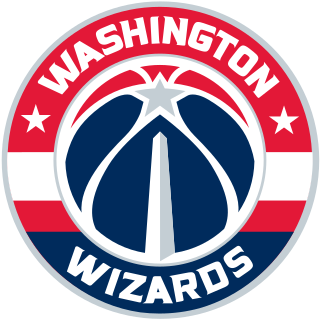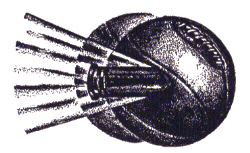Related Research Articles

The Washington Wizards are an American professional basketball team based in Washington, D.C. The Wizards compete in the National Basketball Association (NBA) as a member of the league's Eastern Conference Southeast Division. The team plays its home games at the Capital One Arena, in the Chinatown neighborhood of Washington, D.C.

Vernon Earl Monroe is an American former professional basketball player. He played for two teams, the Baltimore Bullets and the New York Knicks, during his career in the National Basketball Association (NBA). Both teams have retired Monroe's number. Due to his on-court success and flashy style of play, Monroe was given the nicknames "Black Jesus" and "Earl the Pearl". Monroe was inducted into the Naismith Memorial Basketball Hall of Fame in 1990.

Juwan Antonio Howard is an American former professional basketball player and current head coach of the Michigan Wolverines men's team. He was an assistant coach for the Miami Heat of the National Basketball Association (NBA) from 2013 to 2019. Howard played in the NBA from 1994 until 2013.

The Baltimore Bullets were a professional basketball team based in Baltimore, Maryland. The Bullets competed in the American Basketball League (1944–1947), the Basketball Association of America (1947–1949), and the National Basketball Association (1949–1954). On November 27, 1954, the team folded with a 3–11 record, making the Bullets the last NBA franchise to fold. Out of all defunct NBA teams, the Bullets were members of the association for the longest time and the only defunct team to win a championship.

Tyrone Curtis "Muggsy" Bogues is an American former basketball player. The shortest player ever to play in the National Basketball Association (NBA), the 5 ft 3 in (1.60 m) Bogues played point guard for four teams during his 14-season career in the NBA. Although best known for his ten seasons with the Charlotte Hornets, Bogues also played for the Washington Bullets, Golden State Warriors, and Toronto Raptors. After his NBA career, he served as head coach of the now-defunct Charlotte Sting of the WNBA.
The 1970 NBA draft was the 24th annual draft of the National Basketball Association (NBA). The draft was held on March 23, 1970, before the 1970–71 season. In this draft, 17 NBA teams took turns selecting amateur U.S. college basketball players and other eligible players, including international players. A player who had finished his four-year college eligibility was eligible for selection. If a player left college early, he would not be eligible for selection until his college class graduated. The first two picks in the draft belonged to the teams that finished last in each division, with the order determined by a coin flip. The Detroit Pistons won the coin flip and were awarded the first overall pick, while the San Diego Rockets were awarded the second pick. The remaining first-round picks and the subsequent rounds were assigned to teams in reverse order of their win–loss record in the previous season. Three expansion franchises, the Buffalo Braves, the Cleveland Cavaliers and the Portland Trail Blazers, took part in the NBA Draft for the first time and were assigned the seventh, the eighth and the ninth pick in each round. In the first round, the Cavaliers had the seventh pick, while the Blazers and the Braves had the eighth and the ninth pick respectively. In the subsequent rounds, the Cavaliers and the Braves exchanged their order of selection, while the Blazers had the eighth pick throughout the draft. The draft consisted of 19 rounds comprising the selection of 239 players; it holds the record for the most prospects selected in any NBA draft.

Westley Sissel Unseld was an American professional basketball player, coach and executive. He spent his entire National Basketball Association (NBA) career with the Baltimore/Capital/Washington Bullets. Unseld played college basketball for the Louisville Cardinals and was selected with the second overall pick by the Bullets in the 1968 NBA draft. He was named the NBA Most Valuable Player during his rookie season and joined Wilt Chamberlain as the only two players in NBA history to accomplish the feat. Unseld won an NBA championship with the Bullets in 1978. After retiring from playing in 1981, he worked with the Bullets/Wizards as a vice president, head coach, and general manager.

Elvin Ernest Hayes, nicknamed "The Big E", is an American retired professional basketball player and radio analyst for his alma-mater Houston Cougars. He is a member of the NBA's 50th Anniversary All-Time Team, and an inductee in the Naismith Memorial Basketball Hall of Fame.
The 1968 NBA draft was the 22nd annual draft of the National Basketball Association (NBA). The draft was held on April 3, 1968, and May 8 and 10, 1968 before the 1968–69 season. In this draft, 14 NBA teams took turns selecting amateur U.S. college basketball players. A player who had finished his four-year college eligibility was eligible for selection. If a player left college early, he would not be eligible for selection until his college class graduated. The first two picks in the draft belonged to the teams that finished last in each division, with the order determined by a coin flip. The San Diego Rockets won the coin flip and were awarded the first overall pick, while the Baltimore Bullets were awarded the second pick. The remaining first-round picks and the subsequent rounds were assigned to teams in reverse order of their win–loss record in the previous season. Six teams that had the best records in previous season were not awarded second round draft picks. Two expansion franchises, the Milwaukee Bucks and the Phoenix Suns, took part in the NBA Draft for the first time and were assigned the seventh and eighth pick in the first round, along with the last two picks of each subsequent round. The St. Louis Hawks relocated to Atlanta and became the Atlanta Hawks prior to the start of the season. The draft consisted of 21 rounds comprising 214 players selected.

Rodney King Thorn is an American basketball executive and a former professional player and coach, Olympic Committee Chairman, with a career spanning over 50 years. In 2018, Thorn was inducted into the Naismith Memorial Basketball Hall of Fame.

Bailey E. Howell is an American former professional basketball player. After playing college basketball at Mississippi State, Howell played 12 seasons in the National Basketball Association (NBA). Howell was a 6–time NBA All-Star, 2–time NBA Champion and was inducted into the Naismith Memorial Basketball Hall of Fame in 1997.
The 1972 NBA draft was the 26th annual draft of the National Basketball Association (NBA). The draft was held on April 10 and 15, 1972 before the 1972–73 season. In this draft, 17 NBA teams took turns selecting amateur U.S. college basketball players and other eligible players, including international players. The first two picks in the draft belonged to the teams that finished last in each conference, with the order determined by a coin flip. The Portland Trail Blazers won the coin flip and were awarded the first overall pick, while the Buffalo Braves were awarded the second pick. The remaining first-round picks and the subsequent rounds were assigned to teams in reverse order of their win–loss record in the previous season. As a result of last year's supplemental hardship draft, the Cincinnati Royals, the Atlanta Hawks, the Golden State Warriors and the Baltimore Bullets forfeited their first round picks, while the Los Angeles Lakers forfeited their fourth round pick. Prior to the start of the season, the Cincinnati Royals relocated and became the Kansas City-Omaha Kings. The draft consisted of 18 rounds comprising the selection of 198 players.
The 1967 NBA draft was the 21st annual draft of the National Basketball Association (NBA). The draft was held on May 3 and 4, 1967 before the 1967–68 season. In this draft, 12 NBA teams took turns selecting amateur U.S. college basketball players. A player who had finished his four-year college eligibility was eligible for selection. If a player left college early, he would not be eligible for selection until his college class graduated. The first two picks in the draft belonged to the teams that finished last in each division, with the order determined by a coin flip. The Detroit Pistons won the coin flip and were awarded the first overall pick, while the Baltimore Bullets were awarded the second pick. The remaining first-round picks and the subsequent rounds were assigned to teams in reverse order of their win–loss record in the previous season. Five teams that had the best records in previous season were not awarded second round draft picks. Two expansion franchises, the Seattle SuperSonics and the San Diego Rockets, took part in the NBA Draft for the first time and were assigned the sixth and seventh pick in the first round, along with the last two picks of each subsequent round. The draft consisted of 20 rounds comprising 162 players selected.
The 1951 NBA draft was the fifth annual draft of the National Basketball Association (NBA). The draft was held on April 25, 1951, before the 1951–52 season. In this draft, ten remaining NBA teams took turns selecting amateur U.S. college basketball players. In each round, the teams select in reverse order of their win–loss record in the previous season. The Tri-Cities Blackhawks participated in the draft, but relocated to Milwaukee and became the Milwaukee Hawks prior to the start of the season. The draft consisted of 12 rounds comprising 87 players selected.
The 1954 NBA draft was the eight annual draft of the National Basketball Association (NBA). The draft was held on April 24, 1954, before the 1954–55 season. In this draft, nine NBA teams took turns selecting amateur U.S. college basketball players. In each round, the teams select in reverse order of their win–loss record in the previous season. The draft consisted of 13 rounds comprising 100 players selected.
Paul James Hoffman was an American professional basketball player.

David A. Stallworth was an American professional basketball player. He played in the National Basketball Association (NBA) for eight seasons and was a member of the New York Knicks' 1969–70 championship-winning team.
The 1947–48 New York Knicks season was the second season for the team in the Basketball Association of America (BAA), which later merged with the National Basketball League to become the National Basketball Association. The Knicks finished in second place in the Eastern Division with a 26–22 record and qualified for the BAA Playoffs. In the first round, New York was eliminated by the Baltimore Bullets in a best-of-three series, two games to one. Carl Braun was the team's scoring leader during the season.
The Basketball Association of America (BAA) is a professional basketball league in North America, founded in 1946. Following its third season, 1948–49, the BAA absorbed most of National Basketball League (NBL) and rebranded as the National Basketball Association (NBA).
Jack Stone was an American professional basketball player. He was selected with the 11th pick in the 1951 NBA Draft.
References
- ↑ "Baltimore Bullets draft history". databaseBasketball.com. Archived from the original on November 19, 2014. Retrieved December 12, 2014.
- "Baltimore Bullets Draft Register". Basketball-Reference.com. Retrieved 2014-12-12.